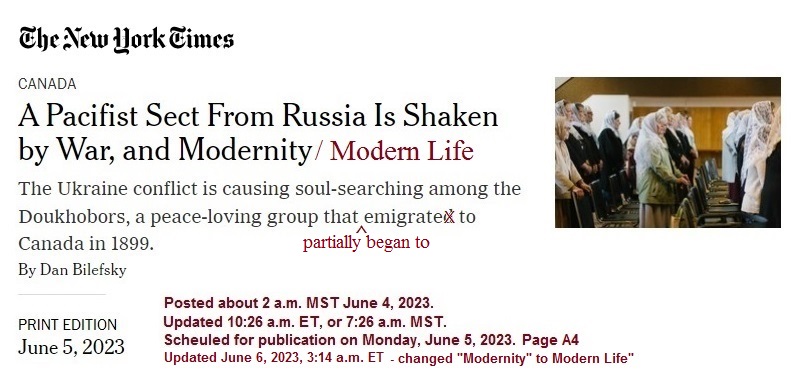
Corrections and comments by Andrei Conovaloff with Koozma J. Tarasoff, Updated July 31, 2023.
Send comments to KJTarasoff@gmail.com
Article source URL: https://www.nytimes.com/2023/06/04/world/canada/canada-doukhobors-ukraine-war.html
This article appeared on the New York Times online page on Sunday morning June 4, 2023, and scheduled for the print edition on Monday June 5, 2023, page A4. For clarity in the printed version, the last word of the heading "Modernity" was changed to "Modern Life", though the online version was not changed. "Modernity" has a specific meaning in the humanities, different from "Modern Life".
The New York times claims their readership is about 10 million (NYT Internal Fact Sheet).
This is our corrected version with comments, and missing context and information in red. Click on links and images for more.
Promotions for this article:
- The 'Backstory': "New York Times shines spotlight on Doukhobors," Interview with Bilefsky by Greg Nesteroff, MyKootennayNow, June 6, 2023, with comments and links.
- Bilefsky about Doukhobors on CBC
Radio One, Corrected interview with Dan Bilefsky by
Alya Ramadan on "Daybreak South with Chris Walker", CBC
Radio One, Kelowna BC, June 6, 2023.
Contents
- A Pacifist Sect ... — Original article corrected with comments and links.
- Biography of author Dan Bilefsky
- Story copied and linked to in other
media
- Email, Social media comments
- Analysis — Word-Phrase Frequency Analysis,
results
- Analysis Summary —
CANADA DISPATCH
A Pacifist Sect* From Russia Is Shaken by War, and Modern Life
The Ukraine conflict is causing soul-searching** among the Doukhobors, a peace-loving group
* Canadian Doukhobors have not been a heterodox "sect" since arriving in 1899 — 123 years ago. In Russia, the majority two-thirds of Doukhobors who did not come to Canada were no longer sectarians in Russia due to new orders of freedom of religion stimulated by the mass exodus to Canada of one-third of the Doukhobors and protests by Count Lev N. Tolstoy. Emigration ended around 1930 after about 8,300 arrived.By Dan Bilefsky
** "Soul-searching" is not mentioned in the article text. Omitted is that most Doukhobors all were deported from the south Ukraine in the 1840s to the South Caucasus, nearly all Doukhobors in Canada came from the South Caucasus in Russia and most Canadian Doukhobors are against any war and injustice anywhere in the world, including racism in Canada, nuclear reactors, the Canada arms trade, etc. (Links are to the Doukhobor Heritage website.)
Dan Bilefsky traveled to Castlegar, British Columbia, for this article, speaking to members of the Doukhobor community* over countless bowls of homemade borscht. He was accompanied by Jackie Dives, a photographer from Vancouver.
* The author tried to cover more than 120 years of broad complicated history in one visit, too often including "Sons of Freedom" in this "Doukhobor community" story, and strays from his headline topics of "War and Modernity (Modern Life)" by titillating readers with nudity and arson. He failed to do his homework or focus on any one story. His excuse is that he was limited to 1100 words, not that he was “initially intrigued” by nudity and arson 50 to 100 years ago.June 4, 2023 (Posted about 2 a.m. MST. Updated 10:26 a.m. ET, or 7:26 a.m. MST.) For print on June 5, 2023
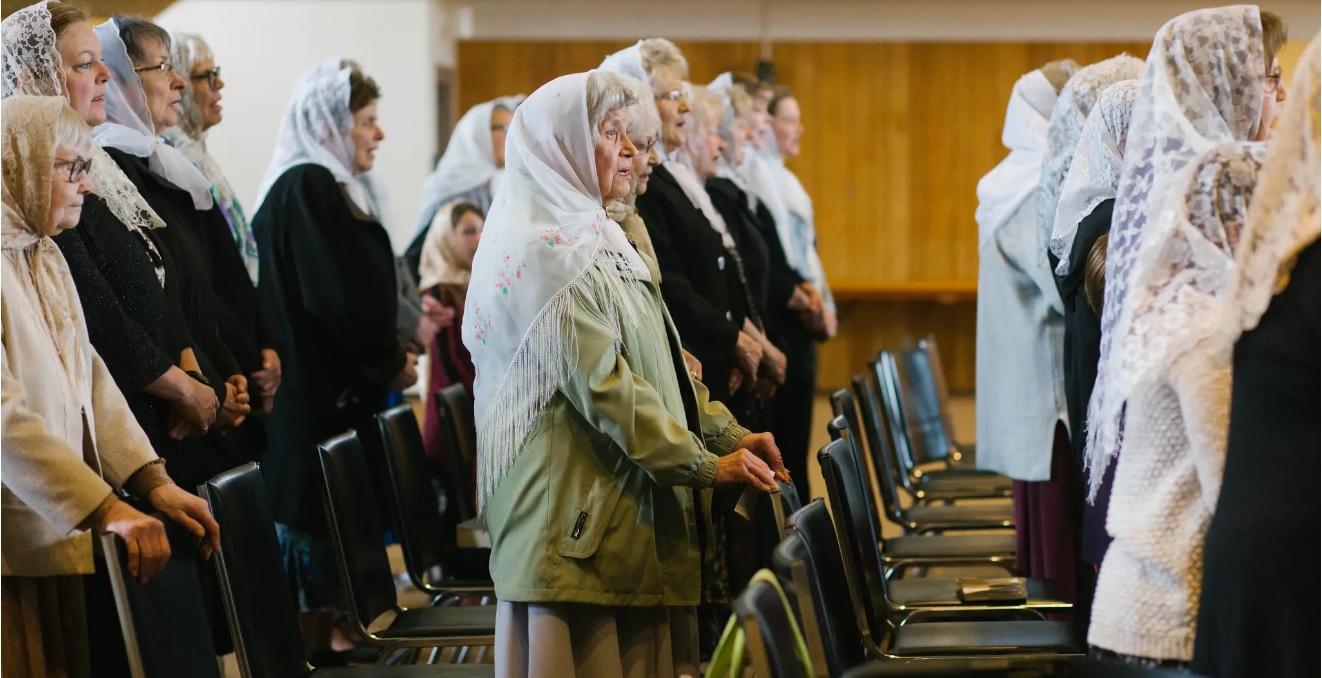
Members of the Doukhobor USCC community during a Sunday morning prayer service last month in Castlegar,* British Columbia.
Credit. Jackie Dives for The New York Times * Photo taken near Castlegar, in the Brilliant Cultural Center, Brilliant B.C.
See videos of USCC meetings below.When he was growing up among the Doukhobors, a pacifist religious group that emigrated to Canada from Tsarist Russia, J.J. Verigin Jr.* would sometimes arrive home from school to find naked elderly women trying to burn down his family’s house.
This is the wrong lede (lead) sentence. The factual lede is buried in paragraph 5 below.One attempt, 54 years ago in 1969, succeeded, lamented Mr. Verigin, 70
It's a shame to journalism that the New York Times misleads readers with "Doukhobor ... naked ... women" in this first lede sentence. This is cheap sensationalism to grab readers attention with sex which diverts from the "Pacifist ... War" theme shown in the heading. The fact that these women are not Community Doukhobors is not revealed for 15 more paragraphs, half-way down this article. In his interview on CBC Radio One on June 6, Bilefsky says he was “initially intrigued” by nudity and arson 50 to 100 years ago. See critical comments below. See the USCC History webpage.
* A lot of Context is missing. In 1999 John J. ("J.J.") Verigin Jr. (1953- ) became Executive Director of the U.S.C.C. Community Doukhobors, Grand Forks. He succeeded his father John J. Verigin Sr. (1921-2008), also nicknamed "J.J.", who was the Honorary Chairman of the U.S.C.C. since 1961. The "women" were symbolically attacking the home of John J. Verigin Sr., mostly while J.J. Verigin Jr was living away from home. This extensive and complex history has been documented, and has nothing to do with the title of this article.
* Link is to: "Aylmer Maude, 80, Tolstoy Aide, Dies ; Translator and Authority on Writings and Doctrines of the Russian Novelist ; He Wrote Widely Himself ; Helped to Send Doukhobors to Canada in 1890s After Their Persecution by Czar," New York Times, August 26, 1938. — '... persecution of the Doukhobors ... Word of their treatment reached Tolstoy and he spread it about the world. In 1898, through the intervention of Mr. Maude, the Society of Friends in London arranged for their transportation in safety and great numbers [8,300 by 1930] to Canada. ... books .. "A Peculiar People: the Doukhobors," [Google Book, Archive.org] ... ' See: Tolstoy and Doukhobors: A list of many online references, by Koozma J. Tarasoff, 2018.The elderly women, Mr. Verigin explained, were part of a small and radical splinter group that left and were banned from
This is serious misinformation implying that Doukhobors are a "radical ... group ... who .. stripped naked and lit buildings on fire ... charged with arson ... getting deported to ... Russia." Bilefsky reinforces this defamation by linking to a 120+ year-old misleading article in his newspaper.These days, with the Ukraine war* raging, most Doukhobors no longer aspire to return to Russia, said Mr. Verigin, who leads the largest Doukhobor organization in Canada and studied in Moscow in 1979. The fires, which for years grabbed headlines** in Canada and polarized the Doukhobors, are also a thing of the past, he stressed.***
* Link is to: "Russian Sect Seeks A Haven Of Refuge; Doukhobortsi Are Dissatistied with Their Lot in Canada," New York Times, March 13, 1901, page 1 — "The 5,000 [7,500] Doukhobortsis, or Russian Quakers, ... consider the free laws of this country too oppressive for them. ... homestead ... ownership ... a sin ... violation of the law of God ... marriage license and pay $2 ... divorce ... obtained only in the courts .. remarry without a divorce ... imprisonment .. births and deaths be registered ... Doukhobortsis have issued an appeal to the nations of the world asking for a haven where they can live their lives untrammeled by man-made laws." — No mention of "getting deported to Mother Russia" in this article, but a group of independent Doukhobors was working in California at this time, after another group of mislabeled zealots was trying to negotiate a mass migration to the U.S.A. which was denied. Here are 2 of many articles about those relevant events.
- Sons of Freedom
DoukhoborsComing; Tolstoi's Disciples Seeking Land In This State; Number Many Thousand; Are Now Represented by Agents Who Are Looking at Ranches in the Vicinity of Santa Barbara, Los Angeles Herald, January 13, 1900, page 4. — This is one of many articles about a proposed mass migration to California by zealots that never happened. The label 'Sons of Freedom' was not used until the 1920s but used here for clarity.
- Russian Quakers: Colony of Doukhobors in California (7 images, 1/2+ page), by N.M. Bobad, M.D., Los Angeles Herald, March 3, 1901, page 7.
— Many found work on the railroads in the United States.
* "War" first appears in this 5th paragraph, after the sensational naked women, arson, and arrests, but focuses on "return to Russia" which annoyed J. J. Verigin Jr. See his comments in: Doukhobor leader calls Ukraine invasion ‘tragic’, by Greg Nesteroff, MyKootenayNow, March 1, 2022.
** Fact file:Russian Doukhobors, orthe ‘Sons of Freedom’, Global News and Postmedia News, December 7, 2012.
— To be corrected. See how this headline joins 2 different groups in one line.
*** J.J. Verigin Jr. "stressed" to Dan Bilefsky that those 120 and 70-year-old events are not today's events.
Not mentioned are:
- The Canadian government did not want Doukhobors to leave Canada, and the U.S.A. did not want them in large groups.
- The minority of Canadian Doukohbors that did consider returning to Russia decreased over time. 40 Independent Doukhobor (edinolichniki) families returned to Russia in the 1920s, but most came back. See: Kukushkin, Vadim. "Back in the USSR," The Beaver, August-September 2006, pages 33-36. — Posted as "A Roundtrip to the Homeland: Doukhobor Remigration to Soviet Russia in the 1920s," Doukhobor Heritage website with 2 more photos, no map.

J.J. Verigin in the memorial park* where his family members are buried. “Pacifism is at the core of what it means to be a Doukhobor,” he said.
Credit...Jackie Dives for The New York Times * Verigin Memorial Park, Brilliant, B.C., is a private cemetery.
“Pacifism is at the core of what it means to be a Doukhobor,* and the war in Ukraine has ended any residual desire that remained to return to Russia,”** said Mr. Verigin, the executive director of the Union of Spiritual Communities of Christ.*** “We feel the emotions of our Ukrainian brothers and sisters because we, too, have faced repression in Russia.”
* This should have been the lead sentence ("lede"), followed by examples of "modernity/ modern Life". See "What it means to be a Doukhobor", a Community Interview video at the Doukhobor Life website (Ahna Berikoff: Producer, Writer & Researcher, Sharon Nazaroff: Administrator & Consultant). Watch on YouTube (20 min) with ads. Download a PDF: "What it means to be a Doukhobor", by Ernie and Teresa Verigin, Gand Forks B.C..In the 18th century, the Doukhobors (the name comes from a Russian phrase meaning “spirit wrestlers”) rejected the icon worship of the Russian Orthodox Church. They also resisted serving in the imperial military; in 1895, thousands of Doukhobors
** Return to the home land has not been a significant desire of any immigrant group in Canada. Reporter Bilefsky appears to be probing about old stories he read. See: "Why are people leaving Russia, who are they, and where are they going?", BBC NEWS, June 4, 2023. The graph shows that "Russian citizens’ requests for asylum in the European Union" have increased 10 times since 2021.
*** Link is to www.usccdoukhobors.org, but casual readers will miss the secondary link to uscc-doukhobors.org "November 20, 2016. New USCC Website Available!"; and most will not explore all the informative links.
* Link is to: "Religious Persecution in Russia: Mr. Felix Volkhovsky in The Forum," New York Times, March 10, 1901, page 25. — No mention of Matvey V. Lebedev (1873-1937) who led the Easter protest, the of burning of arms in 1895 at 3 locations, which led to migration of the most persecuted one-third of all Doukhobors, followed by at least 25 neighboring heretic non-Orthodox, non-Doukhobor sectarian tribes also migrating from South Russia to North America.Tolstoy devoted royalties from his novel “Resurrection”* to help finance the Doukhobors’ transit to Canada, and beginning in 1899, more than 7,500 emigrated to what became Saskatchewan to help farm the Canadian prairies** to prevent farmers from the United States from taking the land.*** From
** One-third of all Doukhobors were not allowed to leave Russia until intervention by Lev N. Tolstoy, Aylmer Maude, the Society of Friends London, the Canadian government, and others.
* This is links to one online version of Louise Maude's translation. More: Resurrection (Tolstory novel), Wikipedia; and many versions at Archive.org
** By 1930 about 8,300 Doukhobors immigrated to Canada, about one-third of all Doukhobors in Russia.
*** The Last Best West, in Sharp, Paul F. Agrarian Revolt in W. Canada: A Survey Showing American Parallels, University of Minnesota Press, 1948, pages 1+
 |
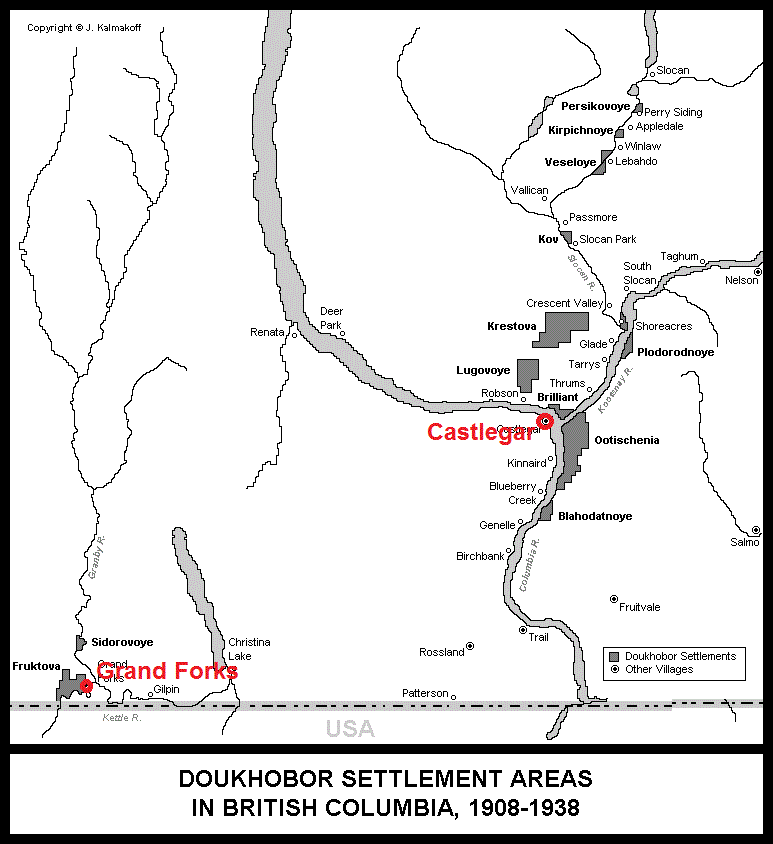 |
An estimated 30,000 to over 100,000 people of Doukhobor descent reside in Canada divided into a broad spectrum of sub-groups and individuals, and for decades many

A replica of a traditional communal kitchen at the Doukhobor Discovery Center. [Link added]
Credit...Jackie Dives for The New York Times
Many Doukhobors in Canada still speak Russian among themselves; some send their children to Russian-language schools; sing Russian hymns at
* The link points to the USCC-Doukhobor page "About Doukhobor Borshch", the Russian transliteration has no "T" at the end. The New York Times must use the recommended spelling of "borscht" from their standard dictionary which specifies the Yiddish-German transliteration that appeared in New York in the mid-1800s. See: Etymology, Borscht, Wikipedia; and Q76: Correct Spelling of borshch?, Spirit-Wrestlers Blog, 29 November 2016.But the Doukhobor way of life has been buffeted by intermarriage, the allure of city life and a younger generation drawn more to TikTok than Tolstoy. Today, Doukhobors are doctors, professors, lawyers, professional athletes* and, in at least one case, a drag queen.**
For more cultural stories on all of these topics and more see: Traditional Doukhobor Folkways: an ethnographic and biographic record of prescribed behaviour (1977, revised 2017).
* More than 200 noteworthy Doukhobors are described in two books by Koozma J. Tarasoff. Spirit Wrestlers: Doukhobor Pioneers' Strategies for Living (2002), and Spirit Wrestlers: Doukhobor Pioneers and Their Friends (2022).“Assimilation is a challenge to our way of life,” Mr. Verigin said, whose wife's ancestry is neither Russian nor Doukohbor.
** Journalist Dan Bilefsky reverts to sex again for "at least one case ...". By juxtaposing one "drag queen" from ~100,000 descendants, and after listing four hard-to-earn professions, Bilefsky nearly cancels the hard earned college degrees for the readers entertainment with snarky irony, perhaps relating "drag queen" to "modernity". The next short sentence mentions "assimilation" followed by a choir, a significant Canadian Doukhobor activity, with no links to Doukhobor singing.
At a recent choir practice* at a Doukhobor cultural center, Jasmine Popoff, 34, a teacher
* No mention of the extensive choir participation or festivals, nor the 600+ Doukhobor songs online: Doukhobor Song Library, Doukhobor Music, Song Albums — Saskatchewan Youth Festivals, 1955-1968, or Doukhobors: The Living Book.“As Doukhobors, it’s important that our culture evolves so that we keep it going,” Ms. Popoff said.
** "Purple hair" may have been mentioned to show that this educator (not a nurse) is "modern", but the reader does not know why a patch of her hair is colored. What was he implying? Maybe she was playing with a young girl who had colored hair spray. It seems he may be reaching for something to write about "Modernity/ Modern Life".
*** Sadly there is no link to the video (1:14 min) of this choir singing the Russian Alliluiya (Аллилуйя) posted on the reporter's Twitter or Instagram (login needed) accounts
**** The 2 links in the article point to non-Doukhobor music.
- Dan Bilefsky, @DanBilefsky — A Doukhobor choir in Castlegar, British Columbia perform a rousing version of Leonard Cohen’s “Hallelujah” in Russian. Doukhobors, a pacifist sect, first emigrated to Canada from Tsarist Russia in 1899.
- Instagram requires account login.
- Leonard Cohen - Hallelujah (Live In London), Oct 2, 2009
- Queen - Somebody To Love (Official Video), Aug 7, 2013
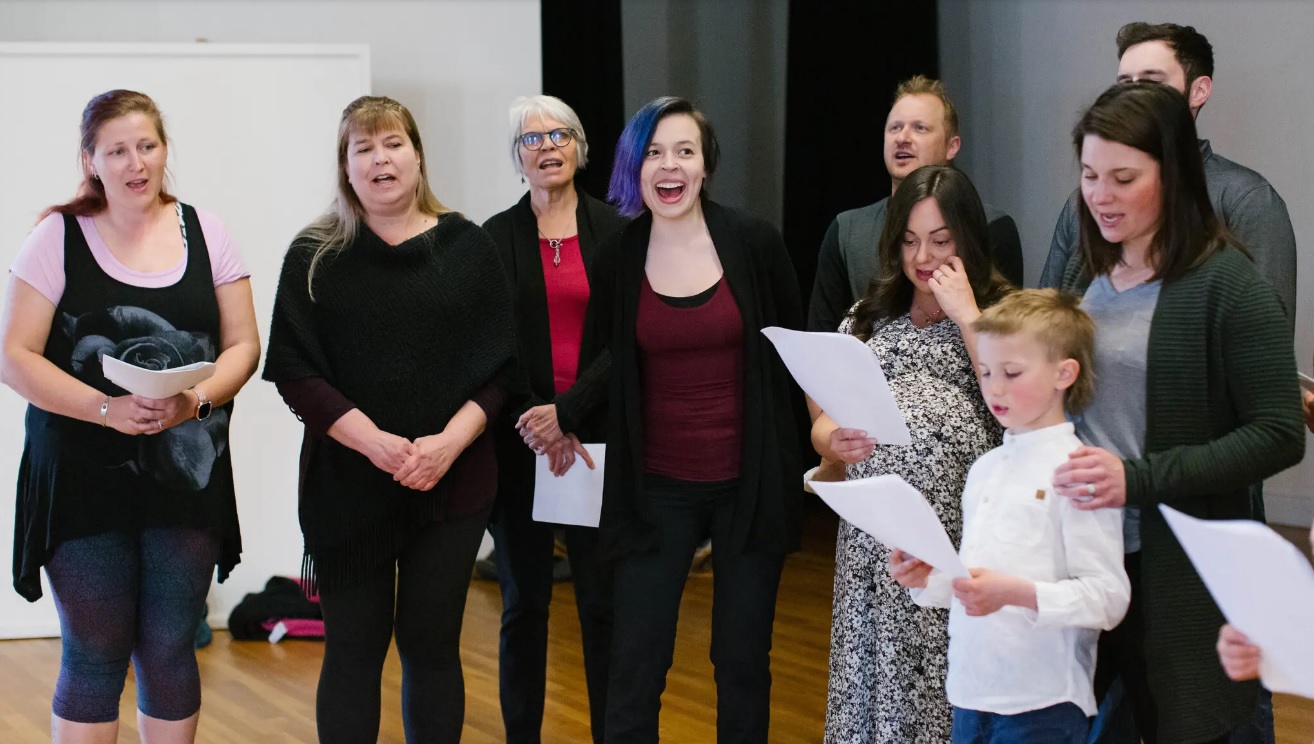
Jasmine Popoff, center, is the director of a Doukhobor choir. “It’s important that our culture evolves so that we keep it going,” she said.
Credit...Jackie Dives for The New York Times.
As the discussion turned to the war during a rehearsal break, choir members of all ages said they rejected the authoritarianism and militarism of Russia’s president, Vladimir V. Putin. “I don’t feel any connection to Mother Russia because Russia isn’t our mother,” said one singer, Kelly Poznikoff.
Mr. Verigin said that, because of anger over the Ukraine conflict, several Doukhobors in recent months had been denied service in local shops in Castlegar.*
* Here's a defamation story angle worth following up, but instead of interviewing offensive shop owners, journalist Bilefsky reverts in the next paragraph to sensational zealots who abandoned the Community Doukhobors over 100 years ago.In the past, prejudice against the Doukhobors in Canada has been fanned by the extremist splinter group, the Sons of Freedom,* which in 1902 called themselves svobodniki (free or sovereign people) and
See more about defamation in Canada against Russians — Ukrainian group condemns Russians participating in Edmonton Heritage Festival, Edmonton Journal (Alberta), May 27, 2023.
* Sons of FreedomAmong the last of the radicals was Mary Braun, who in 2001 (22 years ago), at age 81, was sentenced to six years in prison* after setting fire to a community college** building in British Columbia. Before her sentencing Ms. Braun disrobed in court. She had previously gone on numerous fasts and lit small fires in courtrooms.DoukhoborsDefy Canadian Police; Wives of Sons of Freedom Still Burning Homes, The New York Times, June 24, 1962, page 25.— To be corrected. Notice that this article is linked to from 'the Sons of Freedom', but the title of the 1962 article starts with the word 'Doukhobor ...'.
** Sons of FreedomDoukhoborsdetained in 1950s seek redress, by Caroline Alphonso, The Globe and Mail, April, 5, 2001. —To be corrected. Not mentioned is that many of these now grown children of Sons of Freedom identify as 'New Denver Survivors' and have been negotiating with the Canadian government for an apology and meaningful reconciliation.
- For the first time in this article, in this paragraph 15 of 29 paragraphs, Bilefsky identifies the "extremist splinter group" as "Son of Freedom" — a different "sect" with different leaders, songs, beliefs, rituals, villages, etc. He links to two sources in 1962 and 2001. Both are biased misleading newspaper articles which printed "Doukhobor" in their headers, but were about "Sons of Freedom". This is how journalists systematically confuse themselves and readers, by defaming Doukhobors with the false label of 'Sons of Freedom'.
Also See:
- Selling Freedomites as Doukhobors is False Advertising, Spirit-Wrestlers Blog, 17 June 2014.
- Differences Between Doukhobors and zealot ‘Sons of Freedom’, by Koozma J. Tarasoff, May 18, 2015 — "‘Sons of Freedom’ as an organization no longer exists."
- The 'Sons of Freedom' — a Flashback to 1956: Origins, problems, misconceptions, and relationship to Doukhobors. Re-introduced by Koozma J. Tarasoff, August 19, 2009. Updated June 2023.
* Sons of FreedomDoukhoborsentenced, by Rod Mickeburgh, The Globe and Mail, October, 5, 2001. — She was not a Doukhobor. Why is this sentence here? — To be corrected.
** Selkirk College Adult Learning Centre.
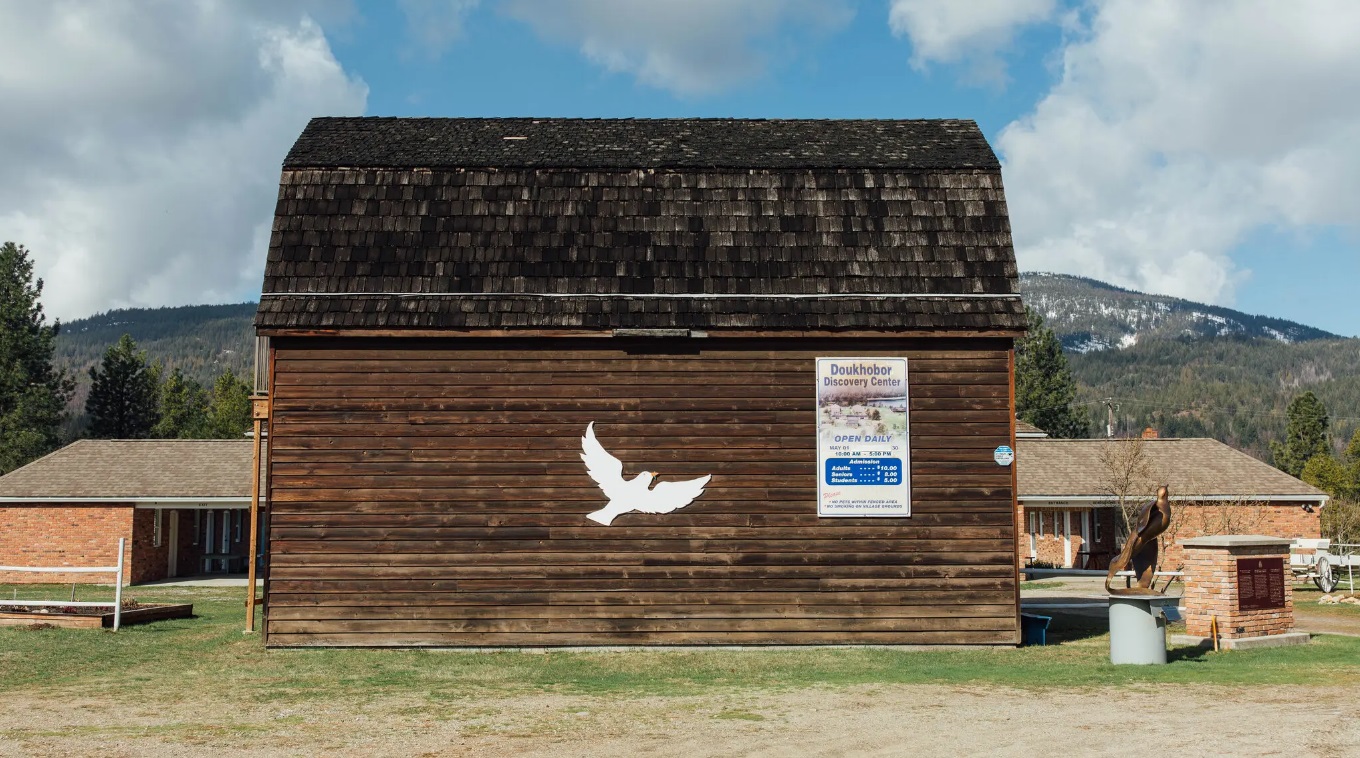
The Doukhobor Discovery Center in Castlegar.
Credit...Jackie Dives for The New York Times
Bilefsky again gets way off his topics of "Pacifist .. War, and Modern Life", reaching far to include any quote from a "Sons of Freedom."Nadja Kolesnikoff, a yoga instructor who grew up in a Sons of Freedom household, said she had been confused at age 5 when her paternal grandmother burned down her own house and was jailed for three years.
“We were supposed to be pulling together as a community,” she said. “I never asked her why she did it.”
But Ms. Kolesnikoff said her upbringing was also empowering. Her family used kerosene lamps and stored vegetables and fruits underground in winter. Luxuries were frowned upon.
“I learned to be self-sufficient, and to this day I feel there is nothing I can’t do,” she said by phone from Costa Rica, where she now lives.
Why "by phone" to Costa Rica, 3400 miles (5400 km) from Castlegar BC? There are hundreds of descendants of Sons of Freedom within 15 miles (24 km) of Castlegar that could have been easily personally interviewed, many who are friends and relatives of people who Bilefsky was interviewing. There is no mention of the USCC or government reconciliation efforts with the descendants of the Sons of Freedom or the New Denver Survivors Collective.At the Doukhobor Discovery Center in Castlegar, the museum director, Ryan Dutchak, said that some Doukhobors over the past decades had changed their Russian-sounding last names* for fear of being ostracized. In Canada’s 2021 census, only 1,675 people identified as Doukhobors.**
- The wife of J.J. Verigin Jr's brother, Barry, was raised in a Sons of Freedom family, and together they manage the USCC journal Iskra.
- Verha (Faith) Malakoff (below) of Sons of Freedom parents, narrated the "Doukhobor Life in Canada" videos with Ryan Dutchak (next) (Ahna Berikoff: Producer, Writer & Researcher, Sharon Nazaroff: Administrator & Consultant).
* See the section: "Surname Changes in Canada," in Guide to Doukhobor Names & Naming Practices, by Jonathan Kalmakoff.“Being stigmatized has pushed some people away,” he said. A major problem is misinformed media like the New York Times.
** See: Guide to Doukhobor Census Records, by Jonathan Kalmakoff;
Dutchak, Ryan. "We've Lost Them Through Assimilation": Ukrainian and Doukhobor Integration in Saskatchewan, 1946-1971, Master's Thesis, Department of History, University of Saskatchewan, October 2020, 119 pages; and
"Doukhbor Life in Canada: A video journey through our history & culture", narrated by Verha (Faith) Malakoff and Ryan Duchak. (Ahna Berikoff: Producer, Writer & Researcher, Sharon Nazaroff: Administrator & Consultant) The project is explained in Tessman, Margaret. "Spirit Wrestlers: Doukhobor Life in Canada", ARTiculate, Spring/Summer 2023, pages 8-9. Article copied (Ahna Berikoff: Producer, Writer & Researcher of the Doukhobor Life Project was interviewed.) .
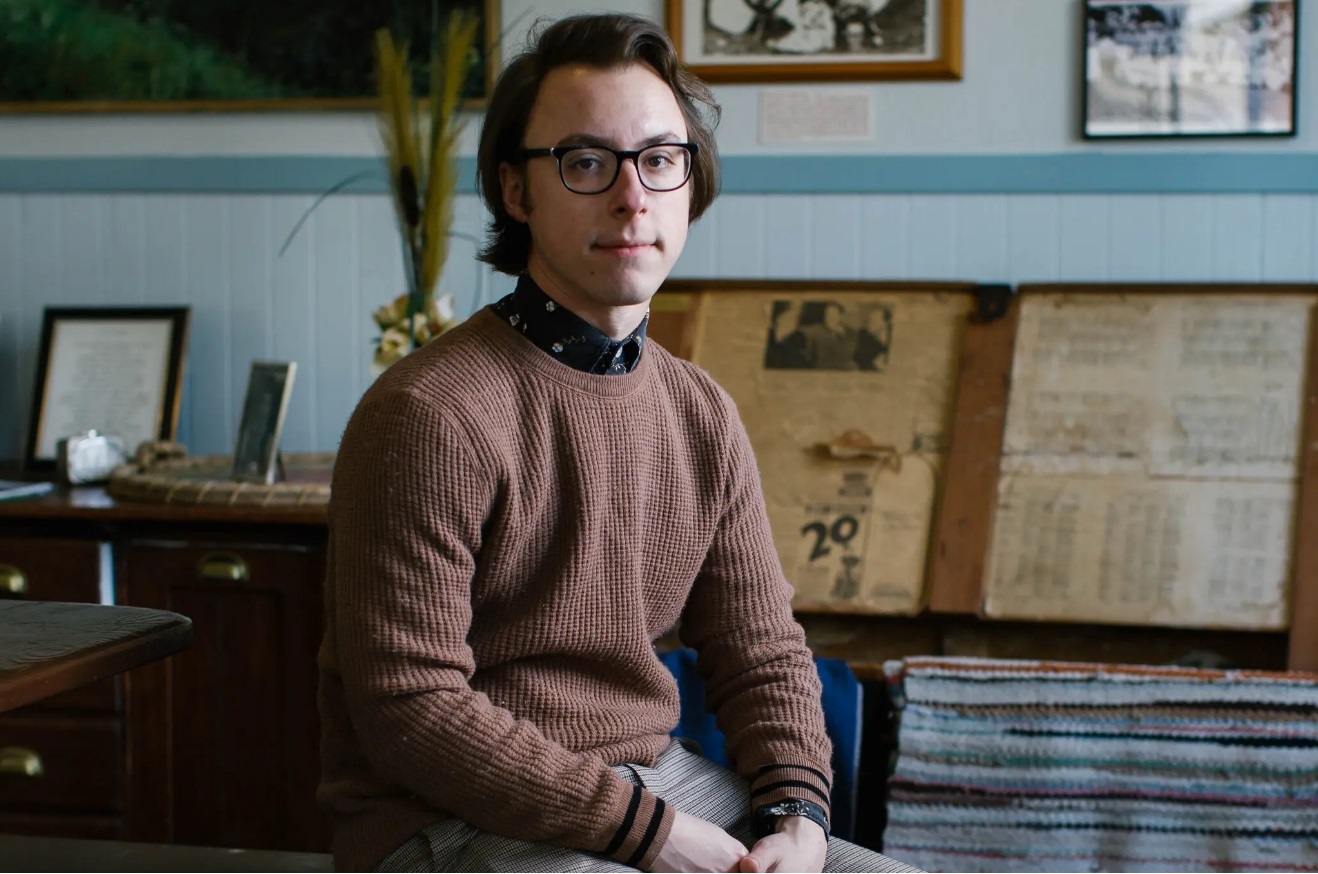
Ryan Dutchak, the museum director at the Doukhobor Discovery Center.
Credit...Jackie Dives for The New York Times
Elders say preserving the Russian language holds the key to the group’s survival.
Also the Canadian Doukhobor culture, traditions, rituals, holidays, psalms, publications, dialect, etcOn a recent Thursday, dozens of Doukhobors gathered for a spiritual meeting. Wearing colorful kerchiefs, blouses, skirts and aprons, the women sat on one side across from the men. On a table lay a loaf of bread, salt and a pitcher of water,* traditional symbols of Doukhobor hospitality.
Koozma J. Tarasoff recommends 2 of his publications:
- Wisdom of the Ages: Unified Doukhobor Beliefs, Updated March 2015
- Q48: How Do Saskatchewan Doukhobors Preserve Their Heritage?, 31 May 2012
* What is the Meaning of Bread, Salt and Water?, Questions & Answers, Comments, By Koozma J Tarasoff, January 17, 2010“Gospodi blagoslovi” — Lord grant us your blessing — they said before singing the Lord’s Prayer in melodious Russian.
The first words are: Отче наш, Ты есть ...: Otche nash, Ty est' ... : Our Father, You are ... Here are 4 recordings;Standing at the front of his classroom at an elementary school in Castlegar, Ernie Verigin,* a Russian teacher, acknowledged the challenges in preserving the Doukhobor faith. “The younger generation wants a quick fix, but spirituality is a lifelong process,” he said. “It’s hard to compete when my 14-year-old daughter is on Instagram and Facebook.”
- Video 22 – 2014 Prayer Service – January 26, USCC Doukhobors, Brilliant BC, Lord's Prayer begins at minute 12:25
- Lord's Prayer (video). Recording of a Saskatchewan Doukhobor Prayer Service, Blane Lake, SK. (YouTube, min 22:07-25:35), Saskatchewan Doukhobor Living Book Project, 2018 — The entire 42-min service is recorded and indexed. These are "Independent Doukhobors".
- 5-minute sample of a USCC prayer meeting in Grand Forks (YouTube, min. 6:35-11:20) followed by a funeral in "The Doukhobors," by George Woodcock. CBC 1977. Another sample of the Lord's Prayer appears at the end. Some statements in this video are misleading.
- Отче наш, Kylemore Choir, Saskatchewan, 1964. (MP3), Doukhobor Song Library. Grand Forks BC
* No relation to J.J. Verigin, Jr. See Ernie and wife Teresa Verigin explain "What it means to be a Doukhobor", a Community Interview video at the Doukhobor Life website (Ahna Berikoff: Producer, Writer & Researcher, Sharon Nazaroff: Administrator & Consultant). Watch on YouTube (20 min) with ads. Download a PDF of their interview: "What it means to be a Doukhobor", by Ernie and Teresa Verigin.The competing pulls of Canadian, Russian and Doukhobor identity can be complicated.
A J Roberts, 21, a video game designer in Vancouver who grew up in Castlegar, regretted that his Russian was rusty. But he is learning to make his own borscht, even if his mother brings him many jars on every visit.
“I am proud to be Canadian but I don’t shy away from saying I am Doukhobor,” he said. “Because of the war, I am more ashamed of saying I have a Russian background.”
—————————
Dan Bilefsky is an international correspondent, based in Montreal. He was previously based in London, Paris, Prague and New York. He was part of the team that won the 2022 George Polk Award for an investigation of the assassination of Haiti’s president. He is the author of the true crime thriller “The Last Job.”* @DanBilefsky
Long Island University Announces 2022 George Polk Awards in Journalism, Long Island University, 20 Feb, 2023
The award for Foreign Reporting goes to the staff of The New York Times for coverage of the war in Ukraine. Two massive endeavors complemented daily contributions from Times reporters, photographers and visual investigators: "The Making of Vladimir Putin," a 6,750-word opus by Paris bureau chief Roger Cohen, traced Putin's "22-year slide from statesman to tyrant," and "Putin's War," the 13,000-word product of two-months of research replete with invasion maps, cell phone intercepts and diaries from Russian soldiers, exposed the vaunted Russian military as unprepared, ill equipped and badly managed.
 His full biography:
His full biography:Dan Bilefsky is an international correspondent for The New York Times, based in Montreal. He returned to Canada in 2017 after 28 years abroad, reporting from, among other places, Paris, Brussels, New York, Istanbul, London and Prague.
In 2022, he was part of the team that won the George Polk Award in Foreign Reporting and was a Pulitzer finalist for an investigation of the assassination of Haiti’s president.
As a correspondent in London, he wrote about terrorism, the rise of the far right and the European refugee crisis. Among his most memorable stories was one about an audacious heist by a group of men in their 60s and 70s, dubbed “The Bad Grandpas,” who stole about $22 million in gems, diamonds and cash from a safe deposit in London’s diamond district. The story was optioned by Hollywood, and Mr. Bilefsky wrote a book on the caper, “The Last Job: The ‘Bad Grandpas’ and the Hatton Garden Heist.”
He was previously based in Paris, where he covered politics, the 2015 terrorist attacks on the satirical newspaper Charlie Hebdo and the trial of Dominique Strauss-Kahn.
From 2008 to 2011, Mr. Bilefsky was based in Prague, where he reported on eastern and central Europe, the Balkans and the Baltic states. In 2010, he and a Times colleague, Doreen Carvajal, investigated the whereabouts of Ratko Mladic, a Bosnian Serb who has since been convicted of war crimes for his role in the Srebrenica massacre of 1995, and had been on the run for 15 years.
From Prague, Mr. Bilefsky also covered the independence of Kosovo; the war between Russia and Georgia in 2008; and the 20th anniversary of the fall of the Berlin Wall, in 2009. He also chronicled blood feuds in Albania and wrote about a former neo-Nazi in Poland who became an orthodox Jew. Mr. Bilefsky has reported frequently from Turkey.
From 2011 to 2012, Mr. Bilefsky covered Queens borough New York City as a metropolitan reporter for The Times. He covered a bizarre case in which a man, Jerry Ramrattan, 39, sexually assaulted his girlfriend, Seemona Sumasar, 36, a Wall Street analyst, and then framed her for a series of brazen crimes that had never taken place for which she was jailed for 7 months.
A native of Montreal, Mr. Bilefsky studied history and literature at the University of Pennsylvania and received a master’s degree in European politics at Oxford University. He started his journalism career at The Financial Times before joining The Wall Street Journal in Brussels. He joined The International Herald Tribune (now The International New York Times) in Brussels in 2005.
Mr. Bilefsky is a passionate food enthusiast and an amateur musician.
Story copied and linked to in other media
Reprinted in The Seattle Times: "In B.C., A pacifist sect from Russia is shaken by war and modernity"
NewsYorks.com, by onegoajio, June 4 : A Pacifist Sect From Russia Is Shaken by War, and Modernity
DNUZ : A Pacifist Sect From Russia Is Shaken by War, and Modernity, June 4, 2023
WORLD NEWSERA: A Pacifist Sect From Russia Is Shaken by War, and Modernity, posted by Evelyn Blackwell, June 4
Today Breeze: A Pacifist Sect From Russia Is Shaken by War, and Modernity
Media Center Indonesia: Beranda News: A Pacifist Sect From Russia Is Shaken by War, and Modernity -- a machine generated story which appears to be a translation of a translation.
FactNews : [Latest] A Pacifist Sect From Russia Is Shaken by War, and Modernity — An audio-video (YouTube, 1:00 min) which converts the New York Times headline into artificial woman's speech: "The Ukraine conflict is causing soul-searching among the Doukhobors, a peace-loving group that emigrated to Canada in 1899." — 10 views on June 6, 2023, 11 am MST.
Linked from Reddit : r/NYTauto, AutoNewsAdmin : [World] - A Pacifist Sect From Russia Is Shaken by War, and Modernity — The New York times Reddit news feed site.
Linked from Flipboard, topic "choir": "A Pacifist Sect From Russia Is Shaken by War, and Modernity"
See Google search for "pacifist sect from Russia is shaken by war"
See Bing search for "pacifist sect from Russia is shaken by war"
See DuckDuckGo search for "pacifist sect from Russia is shaken by war and modernity"
Email, Social media comments
Dr. Andrei Donskov, University Ottawa, June 4, 2023. (Wrote 2 books and edited 8 books about Canadian Doukhobors)
Thank you for sending me Dan Bilefsky's article on my friends, the Doukhobors.
Generally speaking, it is a poorly written piece -- much too much on the Sons of Freedom and not enough on the main tenets of the Doukhobor philosophy -- pacifism, love and respect of humanity, of every single life, of Doukhobors's ceaseless efforts to make the world free of violence.
As to the A.J. Roberts's statement (significantly placed by the author, or the editor, at the end of the article, "Because of the war, I am more ashamed of saying I have a Russian background"), well, it is both sad and unfortunate, especially, since it is the Western actions, their interminable antagonism toward Russia and the Russians, that are, in good part, responsible for this horrible war.
———
Alex Atamanenko, Former MP, teacher, Castlegar, BC July 31, 2023.
Hi Koozma, Thanks for sharing this with me.
I scrolled through some of the information from the New York Times article and came away somewhat disturbed. It appears that from time to time various “outsiders” take advantage of the generous hospitality of our Doukhobor community and tend to focus on the sensational. The current horrific Russian invasion of Ukraine provides a pretext for this kind of reporting.
I wonder why Bilefsky did not mentioned the fact that many oppose the war and stand in solidarity with their Ukrainian brothers and sisters, or that members of the USCC generously donated quilts to refugee Ukrainian families....
We continue to teach English to our Ukrainian family who are adjusting quite well to life in Castlegar in spite of being traumatized by the war....
—————————
Facebook: Doukhobor Discovery Centre
The New York Times featured BC's Doukhobor community in one of their most recent articles! Follow the link below to read more of the story. (Subscription may be required).
6 Likes — 3 Comments (on June 6, 2023, 10:26 am MST)
Alex Bayoff—————————
What a disappointment. This article paints a picture of our strong, value-driven community as a confused group of Russian people trying to distance ourselves from our heritage. The Russian heritage is what makes our Doukhobor community what it is today. Kind people with great traditions who take pride in the life they have built here.
We were told this man was coming to learn about the Doukhobor way of life and write about it. This reporter evidently put the “Ukrainian war” spin on his article and took advantage of our welcoming community for more clicks and to sensationalize his career. Not only a selfish effort on his part, but simply embarrassing. You can always choose what you want to believe in, but you should always remember your heritage and take pride in it, regardless of the current issues. No one likes war or someone who takes advantage of others.
Corinne Postnikoff
Skimmed through......I assume someone corrected Jasmine's occupation....Teacher rather than Nurse... otherwise will review the article in more depth.
Corinne Postnikoff
Of course, rather disappointed in the Introduction......either for sensationalism or attracting reader attention.....
Greg Nesteroff, MyKootennayNow, June 6, 2023
New York Times shines spotlight on Doukhobors, with comments and links.
—————————
Gift Article link, on Twitter by Daniel Silliman: "A fascinating piece about a pacifist group that looks a little different than it did with Leo Tolstoy paid for their immigration to Canada"
—————————
Comment and link on Twitter by Samuel Moyn: "On the pacifist Christians whom Tolstoy loved and funded to move to Canada-and their situation today"
Reply: faisal devji, Jun 4: "I spend a bit of every summer in Doukhobor country where my siblings live. A remarkable community"—————————
Posted by J. Scott on Linkedin from
Chris Monday, Russian Expert/ Economics Professor
Real Russian traditions
"If only each King, Emperor, and President understood that his work of directing armies is not an honorable and important duty, as his flatterers persuade him it is, but a bad and shameful act of preparation for murder-and if each private individual understood that the payment of taxes wherewith to hire and equip soldiers, and, above all, army-service itself, are not matters of indifference, but are bad and shameful actions by which he not only permits but participates in murder-then this power of Emperors, Kings, and Presidents, which now arouses our indignation, and which causes them to be murdered, would disappear of itself. So that the Alexanders, Carnots, Humberts, and others should not be murdered, but it should be explained to them that they are themselves murderers, and, chiefly, they should not be allowed to kill people: men should refuse to murder at their command. If people do not yet act in this way, it is only because Governments, to maintain themselves, diligently exercise a hypnotic influence upon the people." Lev Tolstoy, "Thou shall not kill" [link to NYTimes artticle] https://lnkd.in/g-rJwhmB
—————————
james graff, @lathram, June 4
A lede for the ages by @DanBilefsky : When he was growing up among the Doukhobors, J.J. Verigin would sometimes arrive home from school to find naked elderly women trying to burn down his family’s house.
This colleague praised the first sentence about nude women—————————
LEDE : the opening sentence or paragraph of a news article, summarizing the most important aspects of the story. --
LEDE is the introductory section of a news story that is intended to entice the reader to read the full story. -- Meriam-Webster Dictionary (onlne)
In news reporting, the lede is the main idea in the first few lines of a story. Most writers work hard to make the lede interesting and accurate. -- Vocabulary.com/dictionary
Bilefsky did not bury the lead, his lead strayed from his headline.
Next ....
Analysis
This section in-progress. Return later.
Word-Phrase Frequency Comparing "Doukhbor" and "Sons of Freedom"
| Word-Phrase |
Count |
%
|
| Doukhobors(s) |
35 |
|
| Pacifism 3, Pacifist 2, peaceful 1,
peace-loving 1, Christian 1, faith 1,
Spirit(ed)(ual)(uality) 6, war 3, militar(y)(ism) 2, set
fire to their weapons 1, |
21 |
|
| Names: J.J. Verigin Jr 8, Ernie Verigin 1, Jasmine Popoff 3, Ryan Dutchak 2, Kelly Poznikoff 1 | 15 |
|
| Sub-total | 71 |
63% |
| Sons of Freedom |
2 |
|
| fire(s) 4, lit 2, burn(ed) 2, blaze 1,
destroyed 1, nude 1, naked 2, stripped 1,
disrobed 1, arson 1, splinter 1, radical(s) 2,
protest(s) 2, fasts 1, court 1, charged 1, prison 1,
jailed 1, sentencing 1, excessive materialism 1, getting
deported 1, |
29 |
|
| ostracized 1, stigmatized 1, fear 1, pushed
.. away 1, ashamed 1, Luxuries were frowned upon 1 |
6 |
|
| Names: Mary Braun 2, Nadja Kolesnikoff 2 |
4 |
|
| Sub-total |
41 |
37% |
| Total |
112 |
100% |
The table shows that 37% of these keywords, names and phrases describe "Sons of Freedom" not the Community Doukhobors; and, while the label of the "Sons of Freedom" appears twice compared to 35 times for the "Doukhobor(s)", the behavior and effect of the Sons of Freedom appears 35 times (29+6).
These Doukhobor and non-Doukhobor terms are interwoven in many sentences.
15 Doukhobors are interviewed, and 2 non-Doukhobor "Sons of Freedom" are included, one dead and another in Central America by phone.
Word-Phrase Frequency Comparing "Russia" and "Ukraine"
| Word-Phrase |
Count |
% |
| Ukraine conflict 2, Ukrainian war 1, war in
Ukraine 1, Ukrainian brothers and sisters 1 |
5 |
17% |
| Russian (language) 10, Russia(n) (country,
culture) 15 |
25 |
83% |
| Total |
30 |
100% |
Word-Phrase Frequency Comparing "Pacifist-War" and "Modernity"
| Word-Phrase |
Count |
% |
| Pacifist-War | ||
| Pacifism 3, Pacifist 2, peaceful 1,
peace-loving 1, set fire to their weapons 1, |
8 |
|
| war 5 |
5 |
|
| Modernity | ||
Links to 12 Sources (in order presented)
| Year | Source | Title |
| 1938 |
New York Times |
Aylmer Maude, 80, Tolstoy Aide, Dies |
| 1901 |
New York Times | Russian Sect Seeks A Haven Of Refuge |
| 2012 |
Global News and Postmedia News |
Fact file: Russian Doukhobors, or the ‘Sons
of Freedom’ |
| 2023 |
USCC | USCC Doukhobors: Union of Spiritual
Christians of Christ |
| 1901 |
New York Times | Religious Persecution in Russia |
| 1938 |
Gutenburrg.org |
The Doukhobors, by Aylmer Maude, |
| 2023 |
USCC |
Doukhobor Borshch |
| 2009 | YouTube |
Leonard Cohen - Hallelujah (Live In London) |
| 2013 | YouTube | Queen - Somebody To Love (Official Video) |
| 1962 |
New York Times | Sons of Freedom
|
| 2001 |
Globe & Mail |
Sons of Freedom
|
| 2001 | Globe & Mail | Sons of Freedom
|
4 of the 12 links (33%) are to New York Times archive. This is subtle brand building, or brand reinforcing, to lead NYT subscribers to use the NYT Archive. Non-subscribers could get access through a library account.
—————————
Sentence Topic Frequency
There are 29 paragraphs and __ sentences in this article.
Analysis Summary
Questions for Dan Bilefsky
Why did you lead with "naked ... women" rather than peace/war or modern life?
Did you really want to do a story only about the Sons of Freedom, not the Doukhbors, or both?
Do you believe that Sons of Freedom are not Doukhobors?
Online interviews with Bilefsky about his story
- Dan Bilefsky was interviewed by Greg Nesteroff: New York Times shines spotlight on Doukhobors, MyKootennayNow, June 6, 2023. — Comments and links added.
- Daybreak South: New York
Times journalist explains how Russia-Ukraine war adds
complexity into Doukhobor community, (6:29 minutes) CBC
Radio, about June 6, 2023. — Montreal-based New York Times
reporter Dan Bilefsky speaks to guest host Alya Ramadan on
what he learned from his coverage of the Russian-speaking
community in B.C.'s Kootenays.—Transcript with corrections.
NOTES This section in-progress. Return later.
To many this may seem like to much fuss over just a story overreach
Readers please send suggestions to KJTarasoff@gmail.com
At 1,124 words, this is a short human interest article. B
This story appears to fit the marketing strategy of the New York Time to boost subscriptions by 1925.
This is not the "deeply-reported ... high-quality, trusted independent journalism" promoted by the New York Times. —
The New York Times Reaches 1 Million International Subscriptions, New York Times Company website, November 3, 2021.
It appears that the reporter Dan Bilefsky had read some, but not a lot of old news reports about "Doukhobors" going back to 1901.
It certainly was not to fully report about
seems to be looking for past truths not today's truths.
immediately recycles a stereotype and stick with it for
imagery context overt returns to SoF x times
vacillates between on-topic to off-topic
Shallow research and reference links that take the reader off topic to references about a different "sect" -- the svobodniki (sovereign people) later named Sons of Freedom and Freedomites — 1901 twice, 1938 twice, 1950s, 1962.
Of 6 links to newspaper articles, 4 were to the New York Times, and 2 to the Globe & Mail (Canada).